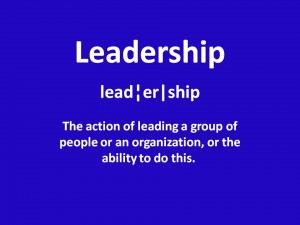Leadership Qualities
Guest blog by Dr Jane Cox
A common myth to dispel at the start is that leadership qualities are the same as the qualities of a good manager – they are not. Some great leaders are good managers, but many good or even great managers, have very little by the way leadership qualities.
Managers get the best out of processes and procedures, leaders get the best out of people.
Leadership qualities can be fluid in definition; in some cases the very qualities that defined a leader’s great leadership qualities in one set of circumstances work against them in another; an obvious example that comes to mind is Winston Churchill, Britain’s Prime Minster during World War II; very few people would argue that his dogged determination and utter single-mindedness was a major factor in the eventual Allied victory, but after the war the public had no appetite for that very same dogmatism and he was effectively thrown out of office.
Which illustrates another key point about leadership qualities – leadership qualities are about taking people willingly along with you, not just telling them what do.
All that said, there are some common traits I think one can define as “leadership qualities”.
These are:
- Honesty
- Integrity
- Ability to admit your mistakes
- Ability to handle stress
- Compassion
- Flexibility
- Tenacity
- Mental (if not psychical stamina)
The ones that get missed in most people’s list of leadership qualities are compassion and flexibility, which is why tyrants & bullies often get mistakenly thought of as great leaders – no great leader leads through fear.
I recall some years ago reading an article about two very different heads of businesses.
First was T.J. Rodgers, CEO of Cypress Semiconductors, who was nominated as “America’s toughest boss at the time”. In Fortune magazine he is described as a crypto-sadist! The plaque above his desk gives you an insight into the man’s character. It reads, “Be realistic; demand the impossible! “, and demand the impossible he did. Employees were given short deadlines and, if they were not met, their paycheques were stopped until they had complied.
“Everyone is treated equally in this firm”, said TJ, “my cheque is also stopped if I fail to deliver on time”. Then he added in his inimitable style, “Of course I don’t have to worry about that crap as I am a millionaire”.
Employees didn’t last long as a rule but those who could stand the pace earned top rewards. And the results spoke for themselves. At the time to company held seventh place in a highly competitive industry.
The other businessman featured was the late Sam Walton, then the richest man in the USA with a personal fortune of $25 billion (at the time the second richest man is only worth a paltry $8 billion!).
Sam’s approach to his Wal-Mart employees was totally different. When his fatal cancer was diagnosed, Sam climbed into his Cessna and spent his last few months visiting as many of his 345,000 Wal-Mart employees as possible. At these meetings he was hugged and kissed by thousands of tearful people, all of whom loved him dearly. One of his last comments was, “No man had this much fun making money”. Starting at the age of 44 he built this business in 30 years through developing loyalty and pride in his people.
Were both men successful? I suppose the answer is “yes” when one relates their achievements entirely to business, building shareholder value and all the other bean-counting measures.
Were both men great leaders? Not in my book.
Dr Jane Cox is a business psychologist, who works with large corporates and entrepreneurs, supporting them on a range of business issues, including leadership, communication, performance improvement, and much more. Dr Cox and Adèle McLay are business partners, having created the Millionaire Entrepreneur Business School that is launching in 2015.
Other articles on What Makes Successful Entrepreneurs:
Seven Secrets of Super Successful Entrepreneurs
Entrepreneurship vs The Meaning of Life
Mega Entrepreneur Defined!
Supercharge Your Profitable Business!
What Makes Great Entrepreneurial Leaders?
All Work + Little Play = Boring!
Entrepreneurial Success without Fulfilment: Who Wants That?
Millionaire Mindset
NZ Entrepreneurship Success
7 Secrets of Business Success
Sir Richard Branson Asks…
Ordinary vs Game Changing
Thriving within the Juggling Act
Business Success and Cookie Dough
What Ice Cream Flavour is Your Business?







